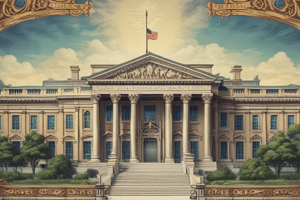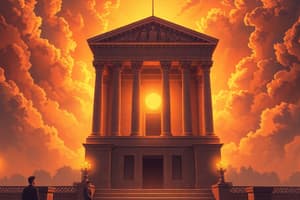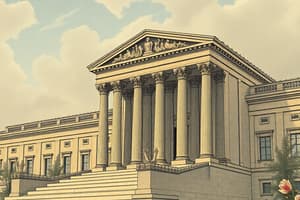Podcast
Questions and Answers
Compared with the executive and legislative branches, what is the main purpose of the judicial branch?
Compared with the executive and legislative branches, what is the main purpose of the judicial branch?
to interpret laws
Which would most likely fall under original jurisdiction?
Which would most likely fall under original jurisdiction?
- A case involving federal law
- An appeal from a lower court
- A case between two states (correct)
- A case involving international treaties
The Constitution gives Congress the power to create federal courts lower than the Supreme Court.
The Constitution gives Congress the power to create federal courts lower than the Supreme Court.
True (A)
In terms of jurisdiction, what does the Supreme Court have?
In terms of jurisdiction, what does the Supreme Court have?
In which jurisdiction would further review of a federal court decision fall under?
In which jurisdiction would further review of a federal court decision fall under?
How is the Supreme Court best characterized?
How is the Supreme Court best characterized?
What does appellate jurisdiction refer to?
What does appellate jurisdiction refer to?
Who makes judgments in lower federal courts?
Who makes judgments in lower federal courts?
Federal judges serve limited terms.
Federal judges serve limited terms.
What is an unanswered Constitutional question about the judicial branch?
What is an unanswered Constitutional question about the judicial branch?
Flashcards are hidden until you start studying
Study Notes
Judicial Branch Overview
- The judicial branch's primary role is to interpret laws, distinguishing it from the executive and legislative branches.
Jurisdiction Types
- Original jurisdiction encompasses cases where the Supreme Court is the first court to hear the case, such as disputes between states.
- Appellate jurisdiction involves the Supreme Court's authority to review decisions made by lower federal courts, examining appeals from previous cases.
Supreme Court Structure
- The Supreme Court operates as an appellate court, primarily reviewing and making rulings on cases already decided in lower courts.
- The Constitution empowers Congress to establish federal courts that are subordinate to the Supreme Court.
Federal Judges
- Judges presiding over lower federal courts are responsible for making judicial decisions.
- Federal judges enjoy lifetime appointments, serving unlimited terms unless they resign, retire, or are removed by impeachment.
Unresolved Constitutional Issues
- A significant unanswered question in the Constitution pertains to the process for creating lower federal courts within the judicial branch structure.
Studying That Suits You
Use AI to generate personalized quizzes and flashcards to suit your learning preferences.





